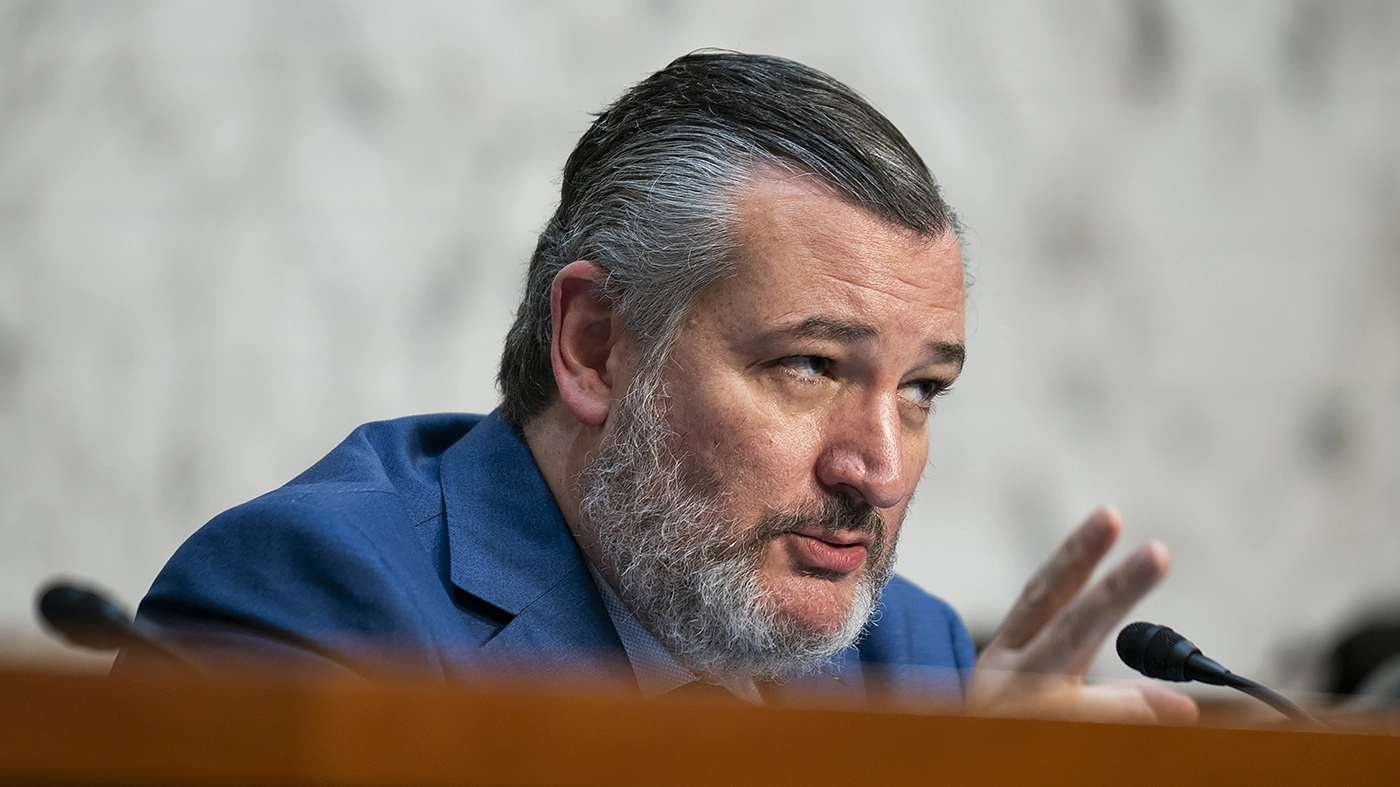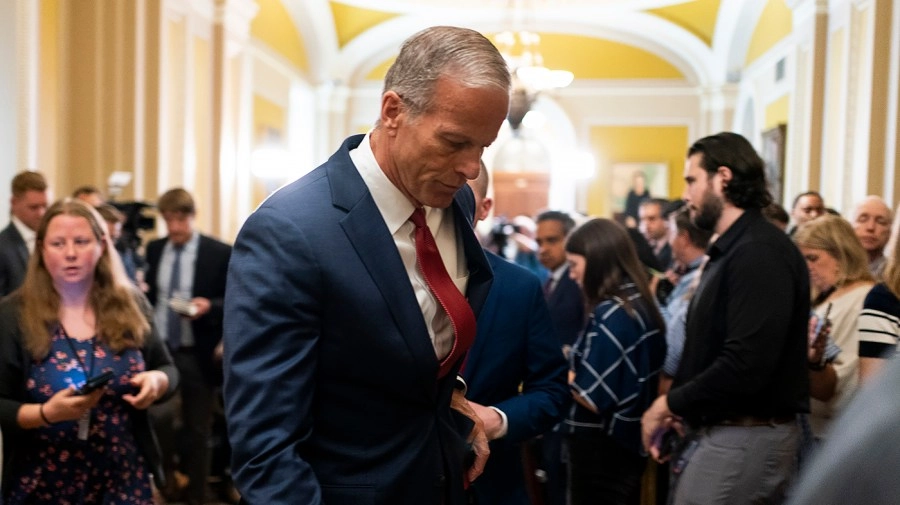

A push to ban state regulation of artificial intelligence for 10 years is setting off a debate among Republicans, further complicating its path towards passage in President Trumps one, big, beautiful bill.

The AI provision has divided Republicans into two camps: one touting the partys traditional support of states rights, and another concerned with overbearing regulation.
As the Senate works out its own changes to the larger tax and spending package, an increasing number of Republicans from both chambers are coming out against the AI provision, which calls for a 10-year moratorium on state laws regulating AI models and systems.
Republicans opposed to the measure differ in their opinions of AI and how beneficial it could be, but share concerns with the federal government stifling the ability of states to set their own rules for it.
Sen. Ron Johnson (R-Wis.), one of the most vocal GOP critics of Trumps broader bill, said Tuesday he is not a real fan of the federal government and is against the provision.
I personally dont think we should be setting a federal standard right now and prohibiting the states from doing what we should be doing in a federated republic. Let the states experiment, Johnson said.
While Sen. Josh Hawley (R-Mo.) has expressed concerns about the economic impact of AI, he said he is willing to introduce an amendment to eliminate the provision during the Senates marathon vote-a-rama if it is not taken out earlier.
Im only for AI if its good for the people, he told reporters, citing AIs potential disruptive impact on the job market. I think weve got to come up with a way to put people first.
Even some House Republicans who already voted to pass the bill in the lower chamber are speaking out against the provision.
A group of hardline conservatives argued in a letter last week to Senate Republicans that Congress is still actively investigating AI and does not fully understand the implications of the technology.
This was shortly after Rep. Marjorie Taylor Greene (R-Ga.) confirmed she would be a no on the bill if it comes back to the House with the provision included.
I am 100 percent opposed and I will not vote for any bill that destroys federalism and takes away states rights, ability to regulate and make laws when it regards humans and AI, the Georgia Republican said.
Sen. Rick Scott (R-Fla.) declined to say whether he would support the moratorium but noted he likes states rights.
Sen. Ted Cruz (R-Texas), the chair of the Senate Committee on Commerce, Science and Transportation, rejected concerns the moratorium could encroach on states rights, pointing to the Commerce Clause in the Constitution.
The Constitution, Cruz said, gives Congress the authority to regulate commerce between the states and AI is quintessentially commerce between the states and having a patchwork of 50 different standards crippling the development of AI.
The battle comes just over a month after OpenAI CEO Sam Altman and other tech leaders appeared before Cruzs committee and voiced their opposition to state-by-state regulation of AI.
Read more in a full report Wednesday morning at TheHill.com.
Welcome to The Hills Technology newsletter, were Miranda Nazzaro and Julia Shapero tracking the latest moves from Capitol Hill to Silicon Valley.
Did someone forward you this newsletter? Subscribe here.
How policy will be impacting the tech sector now and in the future:
President Trump will sign another executive order this week extending the deadline for TikToks parent company to divest the video sharing app, White House press secretary Karoline Leavitt said Tuesday. As he has said many times, President Trump does not want TikTok to go dark, Leavitt said in a statement shared with The Hill. This extension will last 90 days, which the Administration will spend working &

President Trump is taking fire over his posture toward Iran from an unlikely critic in the media: Former Fox News host Tucker Carlson. Trump attacked Carlson directly late Monday, marking a major departure from what has for months been a rosy relationship between the pundit and president. The rift is underscoring GOP divisions on how the U.S. should respond to the escalating crisis in the Middle East and highlighting &

Tech billionaire Elon Musk shared drug test results on Tuesday showing that he tested negative for ketamine after The New York Times reported he was using drugs on the 2024 campaign trail. The Tesla CEO shared a picture of the test results, which showed negative results for several other drugs, on the social platform X, simply captioning the post, lol. Musk continued his criticism of the Times and The Wall Street &

A coalition of Democratic lawmakers are asking tech giant Palantir to turn over details of their contracts with the Trump administration amid reports the data company has been given lucrative contracts that could allow it to assemble a database on Americans. The New York Times reported last month that Palantir is in discussions with numerous government agencies for use of its technology that analyzes data, including &

News weve flagged from t he intersection of tech and other topics:
- OpenAI wins $200 million U.S. defense contract (CNBC)
- Trump officials weighed broader China tech restrictions ahead of trade talks (Wall Street Journal)
Senate passes stablecoin bill in major crypto milestone

Welcome to Crypto Corner, a daily feature focused on digital currency and its outlook in Washington.
The Senate on Tuesday passed legislation creating a regulatory framework for payment stablecoins in a major milestone for the crypto industry.
Lawmakers voted 68-30 to pass the GENIUS Act, which seeks to establish rules of the road for the dollar-backed cryptocurrencies.
It marks the first time that major crypto legislation has cleared the upper chamber. The bill now heads to the House.
With the GENIUS Act, were bringing clarity to a sector thats been clouded by uncertainty and proving that bipartisan, principled leadership can still deliver real results for the American people, Senate Banking Chair Tim Scott (R-S.C.) said in a statement.
This did not happen by accident, he continued. It happened because we led across the aisle and with purpose.
Eighteen Democrats joined with most Republicans to pass the legislation, which has trudged forward through a series of procedural hurdles on the Senate floor over the past four weeks.
Sen. Ruben Gallego (D-Ariz.), who was a lead negotiator for Democrats on the GENIUS Act, touted its passage as proof of what can be achieved through honest negations and a willingness to work across the aisle.
ICYMI: Stand with Crypto, a nonprofit grassroots crypto movement, surveyed 1,000 New Jersey Democratic primary voters last week.
Heres what they found:
- 57 percent of voters say they would be more likely to vote for a candidate who supports pro-crypto policies .
- 62 percent of voters said each candidates position on cryptocurrency influenced their voice choice at least a little.
- One in four of New Jerseys Democratic primary voters said they own cryptocurrency and 22 percent said they previously owned crypto.
Branch out with other reads on The Hill:

NAACP planning to sue Musk AI company over supercomputer pollution
The NAACP and an environmental group are planning to sue Elon Musks artificial intelligence company xAI, amid concerns that its supercomputer facility is prompting air pollution in Memphis, the groups announced Tuesday. The Southern Environmental Law Center (SELC), on behalf of the NAACP, sent a letter to xAI and its affiliates on Tuesday notifying the company of their intent to sue over its alleged continued use of &
Two key stories on The Hill right now:

Youre all caught up. See you tomorrow!
CloseThank you for signing up!
Subscribe to more newsletters here
Tags Josh Hawley Karoline Leavitt Marjorie Taylor Greene Rick Scott Ron Johnson Sam Altman Ted Cruz Tucker CarlsonCopyright 2025 Nexstar Media Inc. All rights reserved. This material may not be published, broadcast, rewritten, or redistributed.





